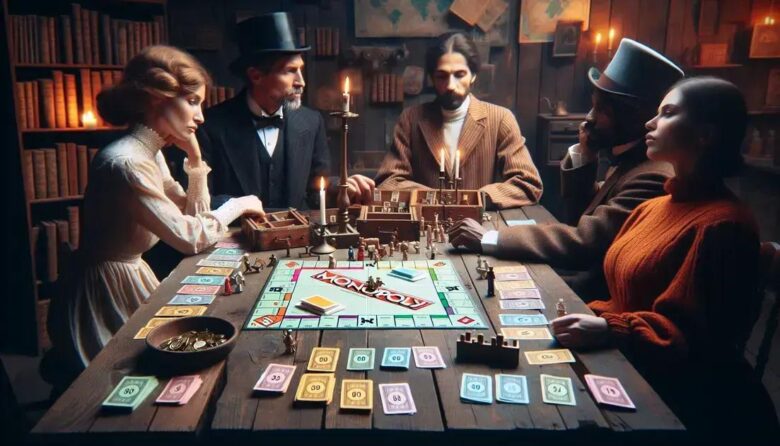Monopoly vintage version common mistakes include misunderstanding original rules, confusing property sets and rent, overlooking Chance and Community Chest card effects, ignoring negotiation, mismanaging money, and neglecting house and hotel strategies.
Ever wondered why the monopoly vintage version common mistakes trip up new players? This classic’s old rules can be tricky, but spotting common errors helps you play smarter and enjoy the game more. Ready to dive in?
Misunderstanding the original rules and game flow
One of the most frequent issues players face in the Monopoly vintage version is misunderstanding the original rules and game flow. Unlike modern editions, the vintage game has specific nuances that affect how turns progress and how transactions are handled.
Many players assume they can skip the starting cash distribution or modify how auctions are conducted, which leads to unfair advantages or confusion. The rules require players to collect $200 every time they pass Go, and skipping this step can change the game dynamics drastically.
Key Rule Details Often Overlooked
Player turns must follow a strict sequence: roll dice, move, manage property, draw cards when landing on Chance or Community Chest, and then perform trades or buy houses if desired. Jumping steps or mixing actions can cause mistakes.
Additionally, the vintage Monopoly does not allow players to hold unlimited money or skip bank loans, which impacts strategies heavily.
Common Gameplay Flow Errors
Errors such as moving again after an extra turn, misunderstanding the jail rules, or incorrectly paying rent when multiple owners share properties can delay or complicate the game.
Reviewing the official rulebook can help players grasp these subtle but important differences. Using a checklist during turns can also ensure the proper flow is respected.
Confusing property sets and rent calculations
A common struggle in the vintage Monopoly version is confusing property sets and rent calculations. Unlike newer editions, the original rules have specific ways to handle property groups and how much rent players owe.
Understanding Property Sets
Players must collect all properties of the same color to form a complete set, which then allows them to charge higher rent. Missing even one property breaks the monopoly, leading to lower rents and less strategic advantage.
In vintage Monopoly, some color groups contain fewer properties than in modern versions, so knowing the correct sets can save time and money.
Rent Calculation Rules
Rent is calculated based on the property group and improvements like houses and hotels. If a player owns all properties in a set, rent doubles on those unimproved properties. When houses or hotels are added, rent increases dramatically, but outdated rent tables can confuse players.
Important: Rent must be paid exactly as listed on the vintage board or cards, not estimated or altered.
Also, some properties have unique rules, like railroads charging rent based on the number owned, which can trip up those unfamiliar with original game mechanics.
Overlooking the role of Chance and Community Chest cards
In vintage Monopoly, Chance and Community Chest cards play a crucial role that many players tend to overlook. These cards can change the game’s direction by affecting player money, positions, and property ownership.
Understanding the Cards’ Impact
Each Chance or Community Chest card has instructions that must be followed exactly, whether it’s paying a fee, collecting money, or moving to another space on the board. Ignoring these effects can lead to unfair advantages or missed opportunities.
For example, the “Go to Jail” card sends players directly to jail without passing Go, which halts income collection for that turn. On the other hand, some cards award money or allow players to repair properties, affecting overall strategy.
Common Mistakes With These Cards
Players sometimes misinterpret card instructions, delay their effects, or fail to collect money owed. This can slow down gameplay and lead to confusing disputes. It’s important to read each card carefully and apply the effects immediately.
Also, some players forget that certain cards affect all players, such as paying for each house and hotel owned. Keeping track of these communal costs is vital to keep the game fair.
Ignoring the importance of negotiation and trading
In vintage Monopoly, negotiation and trading are vital strategies that many players overlook. Successful trading can turn the tide of the game by allowing players to complete property sets and build valuable houses and hotels.
The Role of Negotiation
Players can trade properties, cash, or even Get Out of Jail Free cards. Negotiation skills involve persuading other players to accept deals that benefit both parties. Avoiding trades can limit your options and reduce your chances of winning.
Important: Keep track of offers and think carefully before accepting. Some trades may seem good initially but could empower your opponents.
Common Trading Mistakes
Players sometimes make rushed trades without considering long-term benefits. Other times, they reject trades too quickly, missing chances to gain a competitive edge.
Pay attention to which properties others need and try to negotiate mutually beneficial deals. Timing is also crucial; early trades can build momentum, while late trades might salvage a struggling position.
Mismanaging money and cash flow in the vintage game
Many players struggle with mismanaging money and cash flow when playing the vintage Monopoly version. Poor money management can quickly lead to bankruptcy, ending the game prematurely.
Understanding Cash Flow in Vintage Monopoly
Players start with a fixed amount of cash, and proper budgeting is essential. Spending too much on properties early on without keeping a reserve for rent or fees can cause cash shortages.
Remember, you must have enough money to pay rent, taxes, or penalties when landing on opponents’ properties or drawing certain cards. Running out of cash means selling houses or mortgaging properties, which limits your earning potential.
Tips for Better Money Management
Keep a cash reserve to cover unexpected costs. Avoid overbidding in auctions or buying every property you land on without a plan.
Track your income and expenses closely and negotiate trades that improve your cash position. Also, be cautious with house and hotel investments; they drain cash but increase income if managed correctly.
Neglecting house and hotel building strategies
In vintage Monopoly, many players fail by neglecting house and hotel building strategies. Properly investing in houses and hotels significantly increases rent and helps dominate the board.
The Value of Building Houses
Building houses on your complete color sets is essential. Each house increases rent substantially, and more houses mean exponential rent growth. Focus on getting three houses per property before upgrading to hotels, as this often gives the best return on investment.
When to Build Hotels
Hotels offer the highest rent but require a big cash outlay. Building hotels too early can drain cash reserves, making it harder to pay other fees or buy properties. Timing your hotel construction is key—wait until you have a stable cash flow.
Also, consider opponents’ positions before upgrading. Sometimes holding off on hotels keeps opponents cautious when landing on your properties.
Common Mistakes
Ignoring house and hotel investments or spreading buildings too thin lowers income potential. Another mistake is rushing to build hotels without completing proper color sets or lacking cash for ongoing costs.
Key takeaways for mastering vintage Monopoly
Understanding the original rules, managing money wisely, and using negotiation effectively are crucial to enjoying vintage Monopoly.
Paying attention to Chance and Community Chest cards, as well as developing smart house and hotel building strategies, can greatly improve your chances of winning.
By avoiding common mistakes and focusing on these essential aspects, you can have a more fun and successful game experience.




